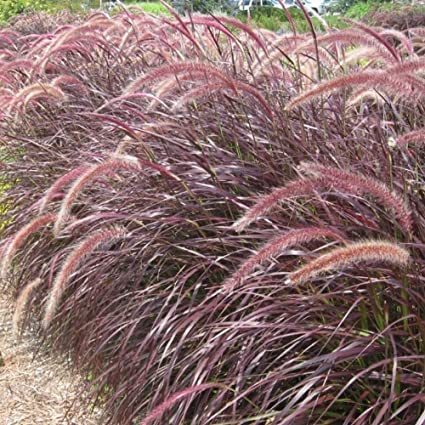Shrubs - test
Many water-wise plants grow well in Calgary. These plants are drought tolerant and also act as great filters and sponges for rainwater runoff. Learn more about the benefits of water-wise plants in our YardSmart Smarty Plants video.
Water wise plants will need additional water for the first two years. After they are established, you can slowly reduce the amount of water they receive; eventually rainfall will be sufficient throughout most seasons.
Ask your local garden centre about plants that thrive in our unique climate, or download our YardSmart Perennials Brochure. We also have more information on what kind of trees and shrubs grow well in Calgary.
Plants native to our region are always a wise choice. Most garden centres carry a selection of native plants and some specialize in native plants. You can find out more about selecting and purchasing native plants through the Alberta Native Plant Council's source list.
Native plants for our region are always a wise choice. Most garden centres carry a selection of native plants and some specialize in native plants.
You can find out more about selecting and purchasing native plants through the Alberta Native Plant Council.
Annuals
Annuals, which are intended to last just one season, are a great way to add new colour and diversity to your yard. Below are just a few of the many water-wise annuals you can choose for your pots or plant beds.
Perennials
Perennials are plants that die back to their crown every fall and survive through the fall/winter to grow back the following year. They add lasting beauty and once established, can reduce the amount of work your yard requires.
There are a wide variety of perennials that can flourish in Calgary with little irrigation in the summer and can adapt to our winters. See a selection of perennials below or download our perennials brochure.
Homeowner Water Guide
Discover a wealth of programs, tips and tools for creating a water-efficient home and yard. Visit Homeowner Water Guide.
Alpine Aster (Aster alpines) – A native to Alberta, this low-growing aster with purple-blue or white daisy-like flowers is great for the front of the bed. Allow to self-seed, as the parent plant is not long-lived. Prefers drier lighter soils but will tolerate heavier clay based soil if well drained. Full Sun. Attracts butterflies.
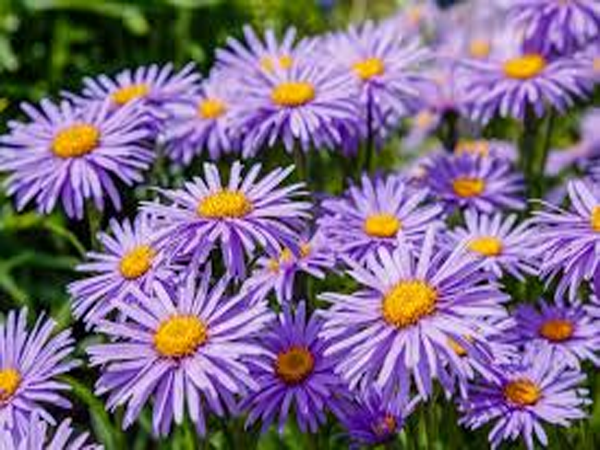
Bearded Iris (Iris spp.) - A bulb plant that produces flat leaves and flower stalks that bloom mid-May to mid-June. Grows 16-30 inches tall and 10-24 inches wide. Full sun.
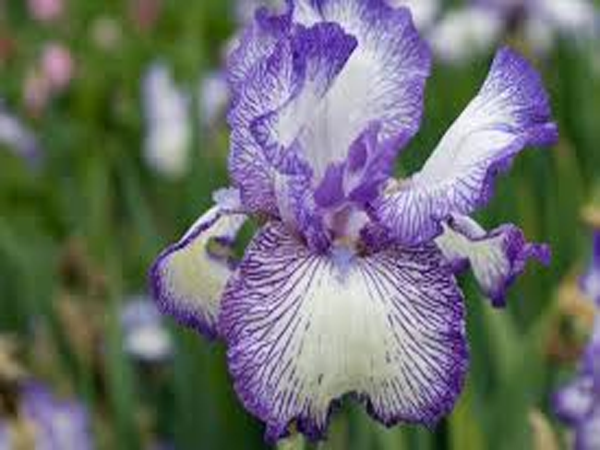
Blazing Star or Gay Feather (Liatris spicata) - A native to the prairies with grass-like foliage and upright spiks of purple flowers that bloom from the top down. Butterlies love these plants. Require full sun and average, well drained soils to flourish.
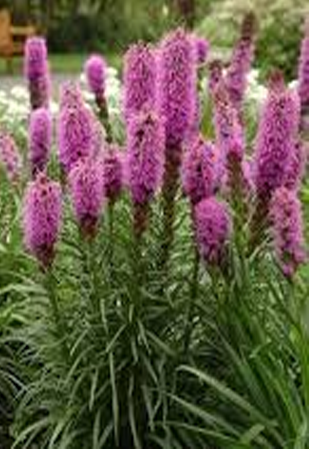
Black-eyed Susan (Rudbeckia hirta) - These cheery plants provide vibrant colour all summer and into fall. They attract butterflies and make wonderful cut flowers for bouquets. They tolerate sun to part shade and poor soil, and grow 18-30 cm.
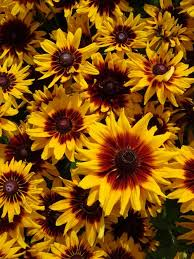
Blanket Flower (Gaillardia aristata) - This plant, native to the prairies, provides cheery blossoms throughout the summer. It enjoys full sun and will tolerate dry conditions. It requires well-draining soil.
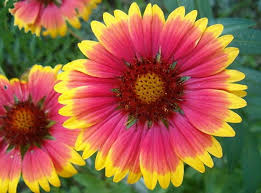
Blue Flax (Linum perenne) - Slender fern-like stalks rise from compact mounds bearing loads of sky blue flowers. A prolific self-seeder in an un-mulched bed, but it is easy to weed out unwanted plants. Versatile in all soils as long as they are well-drained and blooms best in full sun.
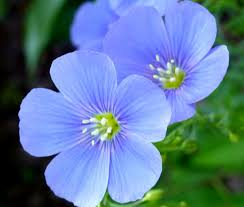
Bluebird Clematis (Clematis macropetala) – A climbing plant with small, blue flowers. Blooms mostly May-June. Can grow up to 10 feet. Prefers a sheltered site with its roots shaded and can tolerate partial shade.
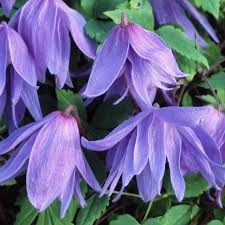
Coral Bells (Heuchera spp.) - Low growing mounds of colourful foliage and slender stalks of delicate pink, red or white flowers make these an attractive plant for the front of the bed. Tolerant of shade and full sun alike, as well as being wind resistant this species with its many cultivars will perform well in all well-drained soils.
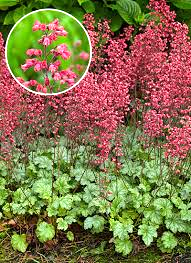
Cranesbill (Geranium x) - A number of perennial geranium options are available such as Johnson's Blue or Dwarf Cranesbill. These plants grow clusters of delicate flowers that bloom throughout the summer. Work well in borders. Full sun.
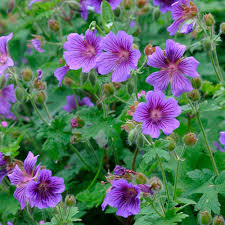
Daylily (Hemerocallis fulva) – Grassy foliage with brownish-orange individual blooms that only last for a day, this species grows well in partial shade to full sun in average soils. Many cultivars are available in a wide range of colour and blooming times throughout the season.
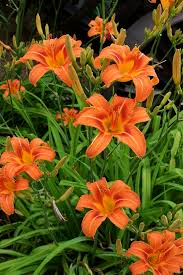
Gas Plant (Dictamnus albus) - Clusters of pink or white flowers with a pungent lemony fragrance in June and glossy dark green leaves make this a great middle of the bed plant for early summer blooming. A slow grower, it has deep taproots that make it drought tolerant when established, and prefers full sun.
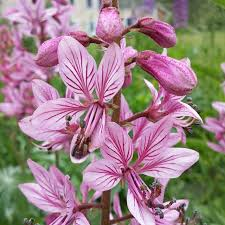
Globe Thistle (Echinops ritro) - A large plant with deeply cut leaves that are silvery-white underneath and stalks with steel blue prickly globes that are a magnet for bees and butterflies in late summer. With a deep branching tap root system the species is best in full sun in average, well-drained soils, but also tolerates light shady spots.
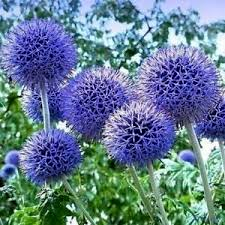
Harebell (Campanula rotundifolia or carpatica) - Provides mounded clumps or shoots of purple bell-shaped flowers that bloom all summer. Full sun to part shade. Do not confuse with creeping bellflower which is aggresively invasive.
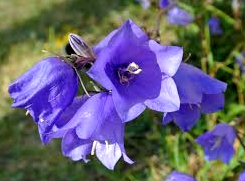
Hens and Chicks (Sempervivum spp.) – Succulent rosettes with the parent plant being the hen, which dies after flowering, and the new growth chicks taking over. A great groundcover for a dry area with full sun and well drained soil.
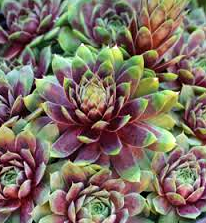
Iceland Poppy (Papaver nudicaule) – A self-seeding poppy with slender stems and paper thin flowers in orange, yellow and cream that bloom freely throughout the growing season. Remarkably drought resistant in full sun and thrives in all soil conditions.
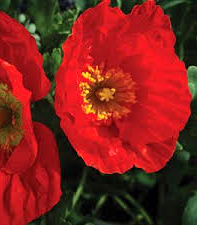
'Jack Frost' Brunnera (Brunnera macrophylla) – A showy plant with large silver and green plants and tiny purple-blue flowers in late spring. Prefers shade.
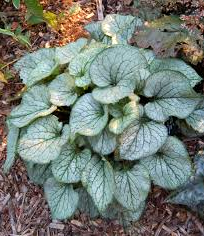
Lamb's ear (Stachys byzantina) – A silver-blue plant with soft, fuzzy foliage. Purple spiky flowers from July-August. Grows 6-8 inches tall and 24 inches wide and likes full sun.
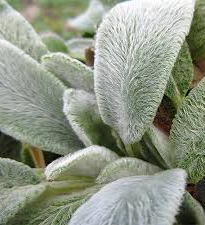
Lungwort (Pulmonaria officinalis) – These shade-loving plants provide striking foliage and colur to dark areas in the garden. Tiny pink flowers appear in the spring. These low growing plants are a good choice for challenging dry, shady areas.
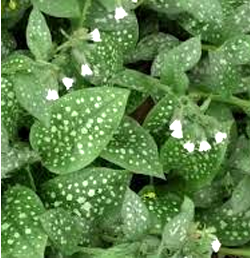
Pasque Flower (Pulsatilla vulgaris) - A deep-rooted relative of our Prairie Crocus (P. Patens), this feathery leaved species with purple petals and yellow centers is often in bloom in early spring. Preferring average well-drained soils it will perform well in partial shade as well as full sun.
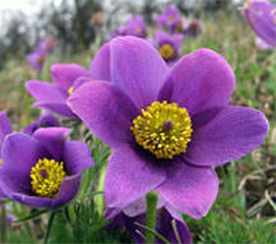
Peony (Paeonia cvs.) - Long lived durable species for the back of the bed or as a specimen plant in a variety of single or double flowers ranging from white through maroon. Thick and deeply rooted these plants flourish in all soil types that have good drainage. Part to full sun.
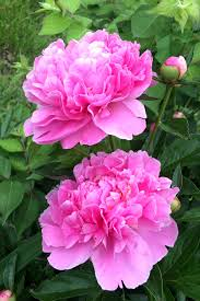
Purple Cone Flower (Echinecea purpurea) - A native of the western United States, this species has a central brown cone fringed with deep pink-purple petals on tall stalks. It has a fine network of shallow roots that enable it to gather available moisture. Adapted to all soil and light conditions excepting deep shade, this versatile plant for the middle of the bed is a great butterfly and bee attractor.
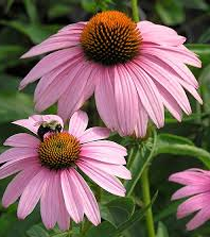
Russian Sage (Perovskia atriplicifolia) - An airy sub-shrub for the back of the border with long stems covered in lavender blue flowers in late summer. While usually forming a neat clump, older plants may become invasive and need to be kept under control. Prefers full sun in dry soil.
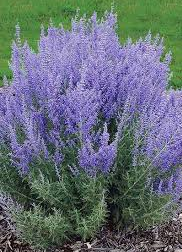
Sea Holly (Eryngium spp.) - A thistle-like plant for the middle of the bed, with steel blue prickly flowers rising from a base of shiny leaves. All species have thick taproots and thrive in dry average soils. Like most blue flowering plants butterflies are attracted to this species. Full sun, Well drained average soil.
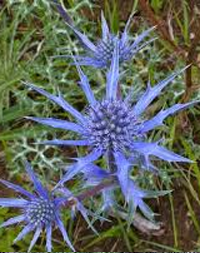
Speedwell (Veronica teucrium 'Crater Lake Blue') – Compact plant for the middle of the bed that is covered in bright blue flowers in June. The plants spread to form a nice clump, are easy to divide, and may need support. Prefers fertile, but well drained soil in full sun.
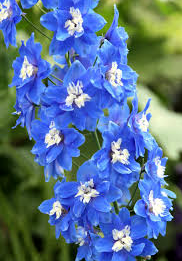
Stonecrop or Sedum (Sedum spp.) - A large group of succulent plants ranging from low groundcovers through tall upright cultivars. 'Autumn Joy' is a staple for the fall bed with stiff stems topped with rose coloured florets, but there are many new cultivars on the market to incorporate into your garden. Part shade to full sun, well drained light soil.
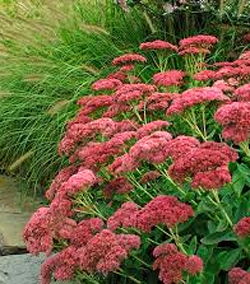
Yucca (Yucca glauca) - A native of southern Alberta that features stiff sword-like grey-green leaves with creamy-white bell shaped flowers. Extremely drought resistant and reliable if planted in well-drained sandy loam in full sun. Groundcovers (Herbaceous)
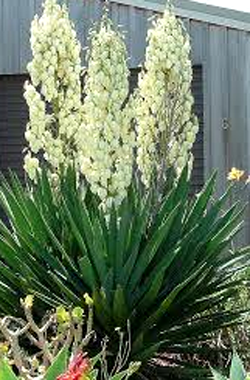
Perennial Groundcovers
Basket-of-Gold (Aurinia saxatilis 'Compactum') - This species forms low growing mounds with small grey-green leaves covered with bright gold flowers in early summer. It is great in rock gardens or the front of the bed, and requires dry soil conditions to show at its best.
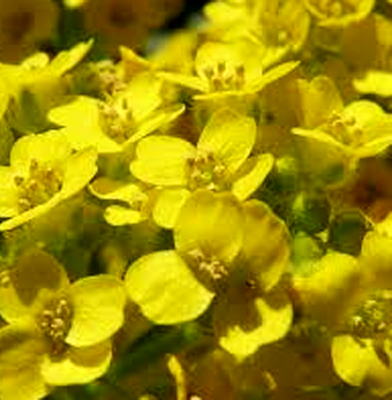
Bearberry or Kinnikinnick (Arctostaphylos uva-ursi) - A native ground cover with round evergreen leaves and delicate flowers in the spring and red berries in the fall. Full sun to light shade.
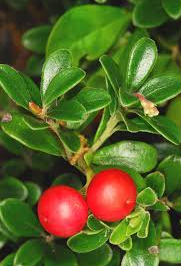
Creeping Jenny (Lysimachia nummularia "Aurea") - This is an excellent spreading groundcover for shady spots and trails nicely over rocks or walls with yellow flowers in midsummer. It does best in partial shade but will tolerate sun and shade as well. It is good for moist locations and a good plant to take advantage of rainwater runoff. It does spread but can be easily picked back by pulling stems out. Helps attract bees to the yard.
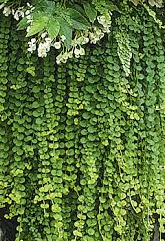
Maidens Pink (Dianthus deltoides) - This species forms dense mats with fibrous roots and tiny, dark green leaves covered in bright red flowers on small stalks in mid-summer. An easy, self-sowing plant, the spaces between flagstones will quickly fill in. It requires well-drained soil and full sun for best flowering, but will tolerate light shade and even grow beside spuce trees.
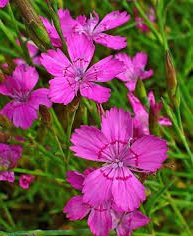
Mother-of-thyme (Thymus serpyllum) - This species forms an evergreen mat with tiny purple-pink clusters of flowers in mid-summer and spreads by creeping stems. Try to keep covered with snow over winter to prevent browning of the tiny leaves that turn dark purplish-green in fall. Average to dry soil. Prefers a dry sunny location - does well in sun to partial shade cast by spruce trees, along walkways and rock gardens.
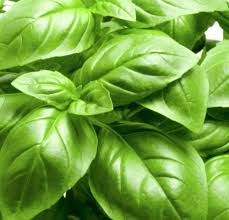
Pussytoes (Antennaria diocia) - A praries native, this species with tiny, silvery leaves forms low mats that readily interweave with other plantings. Short stalks of rose pink flowers come in mid-summer. It performs well in all well-drained soil types, and will tolerate partial shade, but prefers full sun.
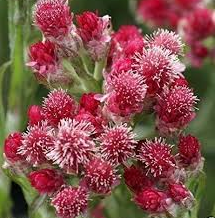
Perennial Ornamental Grasses
Blue fescue (Festuca ovina var. glauca "Elijah Blue") - These low growing clumps of fine, wiry, blue-grey blades have tan coloured seed spikes that can be removed or left onto provide winter interest. They require well-drained soil to flourish. Prefers full sun, but tolerates partial shade.
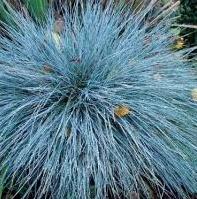
Blue oat grass (Helictotrichon sempervirens) - This species is a large, clump-forming evergreen grass with blue leaves and tan seed heads held on tall stems. It flourishes in growing conditiions similar to that needed by blue fescue. It prefers well-drained soils. Partial to full sun.
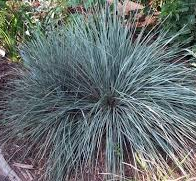
Karl Foerster feather reed grass (calamgrostis x acutiflora "Karl Foerster" - These compact, green-leaved clumps have tall wheat-like seed heads that persist through the winter. This grass does well in all soils, but thrives in clay. Partial to full sun.
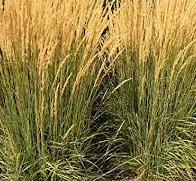
Crimson fountaingrass (Sporobolus heterolepis) - Commonly known as prairie dropseed, is a species of prairie grass native to the tallgrass and mixed grass prairies of central North America.
